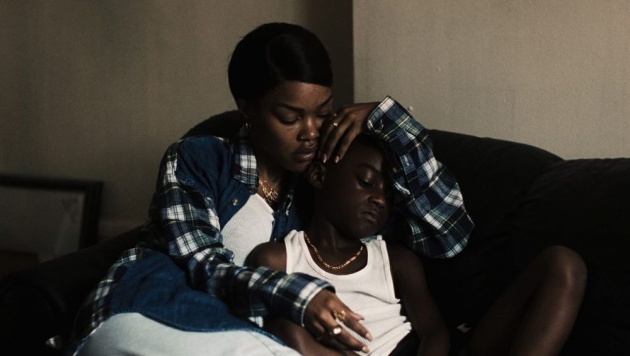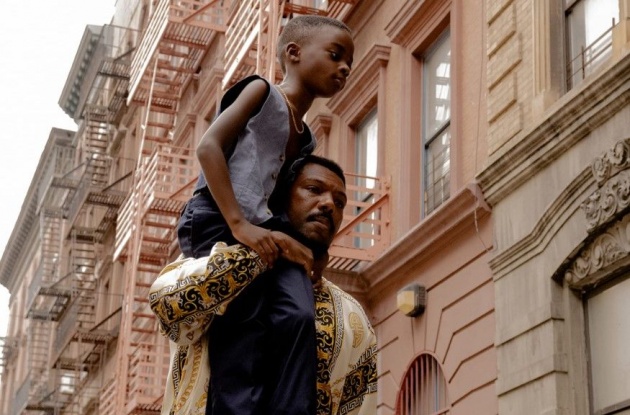
Pictured: Inez (Teyona Taylor) and Terry (Aaron Kingsley Adetola) looking for a place to stay in a scene from the New York City-set drama, 'A Thousand and One', written and directed by A V Rockwell. Still courtesy of Focus Features (US) / Universal Pictures (UK)
Nobody knows anything. This applies to judges at the 2023 Sundance Film Festival who awarded writer-director A V (Aline Victoria) Rockwell’s feature debut, A Thousand and One, the Grand Jury Prize only to see the film flounder at the US box office upon its release on 31 March (gross: $3.386 million to 27 April 2023). Rockwell’s film has, like its single mother protagonist, Inez (Teyona Taylor) a defiant dignity built on unsteady foundations. The structure is bold, divided like Moonlight into three distinct time periods (1995, 2001, 2005) – four if you count the opening scene on Riker’s Island (1994). At its heart is a ticking time bomb: what will happen to Inez when the crime she has committed eventually comes to light?
The New York City-set drama, which takes its title from a door number, but also offers itself a riposte to 2001: A Space Odyssey – the characters in A Thousand and One fight for space – is ambitious in scope, tying Inez’s story to changes ushered by successive mayors, Rudy Giuliani in 1995 and Mike Bloomberg in 2005. The Harlem neighbourhood where Inez lives changes, with a white landlord offering free repairs but allowing conditions to get worse. Gentrification is carried out in an insidious manner, with low-income residents being forced out. Asking the white neighbour opposite whether she has seen ‘the super’ (building supervisor), Inez is met with indifference.
After overhead shots of the city featuring the since-destroyed twin towers of the World Trade Center, the film introduces us to Inez in a prison cell, tending to the hair of another female inmate. The other woman is grateful. This short scene barely registers but is relevant to the film’s twist. We next meet Inez fresh out of jail, trying unsuccessfully to get her old job back. ‘You think I’m going to hire you for what you did?’ her former boss asks her with incredulity, before throwing some dollars at her, adding ‘That’s what you came for.’ Inez’s crime isn’t spelt out but both she and her former boyfriend, Lucky (Will Catlett) ended up in prison, apparently as co-conspirators.
A scene of Inez back in her old neighbourhood is notable for its framing. The camera is placed low and looks up at Inez as she passes, dwarfed by the red-walled building next to her. The city looms large, but there’s no glamour to it. Inez’s main focus is on a schoolyard, where she sees a six-year-old boy, Terry (Aaron Kingsley Adetola). She calls to him. ‘Do you remember me?’ ‘No,’ replies the boy, disobeying the rule about not talking to strangers. Terry is living in a foster home and not exactly happy about it. Inez, we learn, also grew up in a foster home and definitely didn’t enjoy the experience.
Passing the school and not seeing Terry, Inez discovers that the young boy is in hospital. She visits him. ‘What do you like?’ she asks. ‘Power Rangers,’ answers Terry. During her next visit, she brings him a Power Ranger-like red action figure. She plays with him with a blue figure, edging towards a bond.
It isn’t long before Inez, whose name we learn very late in the drama, takes the boy out of school in Brooklyn, heading off to Harlem. After all, she is his mother. She subsequently begs for places to stay. Not all of her pleas are heeded. In one memorable scene, Inez is in a phone box being prompted to leave a message. Terry, anxious to escape the cold, pounds at her with his fists for putting him in this situation. Eventually one of her friends picks up.
Behind the friendly face of Kim (Terri Abney), willing to welcome Inez and Terry into her house stands a mother (Delissa Reynolds) with a scowl of thunder and a piercing stare. Both women are implicated in Inez’s crime – taking Terry without a legal right – but there is a tacit understanding that the boy should be with his mother. Inez leaves Terry alone with them and returns to say that she’s found a job. She wants to be a provider and responsible. Nevertheless, they cannot stay. In one exchange with Kim’s mother, Inez dismisses the offer of a job in Queens – that’s a two-hour commute. The older woman glares accusingly.
Inez and Terry move to a shelter, but the conditions are appalling. She sees an advertisement and takes the whole set of detachable phone numbers to ensure she can secure the room. The landlady gives Inez a suspicious look. Nevertheless, she makes a firm claim for our sympathy, even though it comes at the expense of Terry, who is kept out of school so Inez can avoid detection. In one scene, he goes outside. Inez is furious, having chased after him. She decides to give him a new name, Daryl Lehmann. ‘I hate that name,’ pleads Terry. The pseudonym is necessary to enrol him for school. Their relationship improves when they finally move into their own place. Inez throws a soft ball at Terry. The kid takes a swing.

Pictured: Lucky (Will Catlett) carrying Terry (Aaron Kingsley Adetola) in a scene from the New York City-set drama, 'A Thousand and One', written and directed by A V Rockwell. Photo: Aaron Ricketts, courtesy of Focus Features (US) / Universal Pictures (UK)
‘Who’s my daddy?’ Terry asks Inez. ‘You’ll meet him one day,’ she replies evasively. Terry is introduced to Lucky. ‘He’ll be staying with us for a bit,’ Inez explains. Lucky, we learn, has just got out of prison, sentenced along with Inez. Terry views Lucky with a mixture of suspicion and fear. ‘How are you doing, little man?’ Lucky asks him. Terry is too frightened to answer. Nevertheless, a question occurs to the audience: is Lucky Terry’s father? Lucky and Terry bond when the two go out an errand. ‘Walk on the inside,’ Lucky tells him, indicating that he’ll be protected that way, advice that Terry will repeat.
In the middle-third of the movie, now aged thirteen, Terry (Aven Courtney) is doing well at school and offered a place at a technical college. Terry is resistant. ‘If you don’t go, you have to move out,’ Inez tells him. Terry is told that he shouldn’t be afraid of being smart. Rockwell makes the point that with appropriate amount of nurture, young African American boys can realize their potential. This is a drama without sex or guns, replacing them with heart. Heart and cussing, accounting for the film’s rating. It does however have basketball. Terry and Lucky cement their bond shooting baskets after Inez kicks Lucky out.
The final third turns everything we have watched on its head. Terry (Josiah Cross) is seventeen. Once again, we’re told he – or rather Daryl – is a bright kid. His teacher, Ms Tucker (Amelia Workman) offers Daryl a job, but requires his social security number. Does he even have one? Meanwhile, a visit from the aforementioned new landlord invites bad repair work on Inez’s residence, to the extent that there’s a leak from above. Terry rifles through some papers and confronts Inez. ‘All I wanted was a dad,’ he tells her angrily. Meanwhile Lucky is hospitalised and dies from cancer. There is a funeral party. Opposite the house, reluctant to approach to pay their respects, stand Lucky’s former partner and daughter.

Pictured: Inez (Teyona Taylor) in a scene from the New York City-set drama, 'A Thousand and One', written and directed by A V Rockwell. Photo: Aaron Ricketts, courtesy of Focus Features (US) / Universal Pictures (UK)
The drama practically explodes when Ms Tucker pays a visit, accompanied by another woman and a police officer. Inez is forced to flee. It is then that we learn the truth. In a parallel plotline, Terry falls for a girl who works behind the counter of a deli. He phones her to express his feelings. ‘Don’t you be phoning me at my place of work,’ she tells him abrasively, before agreeing to go on a date. ‘Walk on the inside,’ Terry tells her.
And that twist? I won’t reveal it here. Suffice to say that there is a reason that the police are slow to track down Inez. Terry confronts her as she returns to the house to pack up her belongings. Her explanation isn’t clear, but we intuit her reasoning. Not while watching the film, but later.
Cross doesn’t convince us that he’s playing a smart kid; Rockwell directs him to be socially awkward, as if his mother had not taught him how to be with women. Inez herself is a fierce presence, fighting for what she has, but recognising when the battle is lost.
A Thousand and One is a tribute to the mothering and nurturing spirit that exists in women and the power to steer men on good paths. The film’s depiction of race relations is more complex. The landlord seems like a good guy, but his persona is a sham. He won’t row with Inez. ‘We’re adults,’ he says with a lowered voice, anxious to take the heat out of Inez’s accusations when the repair work ordered goes sour. Inez lives between the cracks of a shattered society and knows it. Her aspiration is to run a salon, though she doesn’t achieve this. There is the sense that motherhood is a compensation for unrealised dreams – though there is no reason why it should be. We respond to Inez’s determination but are repelled by her wilfulness. She hasn’t thought through the implications of her actions for everyone concerned; she doesn’t have a strategy.
Raw, edgy and a little clunky, A Thousand and One isn’t quite the finished article. It does not move audiences on a deep level, partly because of the extreme action taken by its protagonist. However, it is many other things: a work of promise, challenging and seeking to redefine the women’s film. Inez may not hold all the cards, but she’s willing to change the game. Rockwell shares her spirit.
Reviewed at Ritzy Cinema, South London, Screen Two, Tuesday 25 April 2023, 17:45 screening



